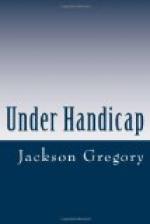A frenzy of terrified rage upon him, he stiffened in his stirrups, he shook his clenched fist at the quiet, jeering face whose very unmoved stillness was like a deep contempt, and cursed it, his voice springing harshly through his dry lips, rising almost into a sobbing shriek, dying away without an echo, leaving the face of the desert quietly contemptuous. For he grew suddenly as silent, a word cut in two by the click of his teeth, the sound of his own voice in his ears tricking him.
Breathless, a man turned to stone, he listened.
He had heard something—he knew that he had heard a voice, not his own, a voice hardly more than a faint whisper, calling to him, calling again, then lost in the all-engulfing silence. About him the miles were laid bare in the sunlight. There was nothing.
Driven from the moment of inactivity into a madness of haste, tormented afresh at the thought that he had lost one precious minute, he cut anew with his red-roweled spurs into the torn flanks of his horse, and rode on, careless of all save that he must hurry, that his was a great race against the racing day, that he must find her before the night had sought her out. The very shadow which he and his horse cast—a distorted, black centaur sort of thing, running silently across the desert—was one with the desert in its cursed menace. For a moment ago it had hidden under his horse’s belly, and now it ran beside him, ever lengthening, ever pushing farther to the eastward, a grim avowal that the day was passing.
The miles fled behind him like lean greyhounds. The miles before him reached out in unshortened endlessness. It was one o’clock. He had been gone two hours—he had done nothing. Now, far ahead, he caught sight of moving figures, saw a man yonder on horseback, saw another, hardly more than a drifting dot against the sky-line to the east, another yet to the west.
They were still searching for her, still pushing deeper and deeper into the burning solitudes; they had found nothing. They must be, he estimated roughly, twenty miles from Valley City. Had she ridden so far? Why hadn’t she told him more about the location of the spring? If there was a spring, had she clung close to it when her horse had left her? Then she would not die for want of water! Or had she dug with breaking nails into the soil which had in it moisture enough to feed the roots of the yellow willows but which would but mock her as the desert mocked him, refusing to yield up one single drop of water?
Gradually, steadily he swung toward the left, riding a little to westward so as not to be seeking over the same territory across which the men before him had ridden. And as he rode he saw, a mile away from him, still farther to the west, a ring of hills, and he prayed that he might come upon the spring there and upon Argyl. And his moving lips were not still before he had found her.
He had swept down into a little hollow, the slightest of depressions in the sandy level, not to be seen until a man was upon its very rim, floored with scanty, dry brush. His tired horse threw up its head and shied. But Conniston had seen her first, a huddled heap, almost at his feet.




